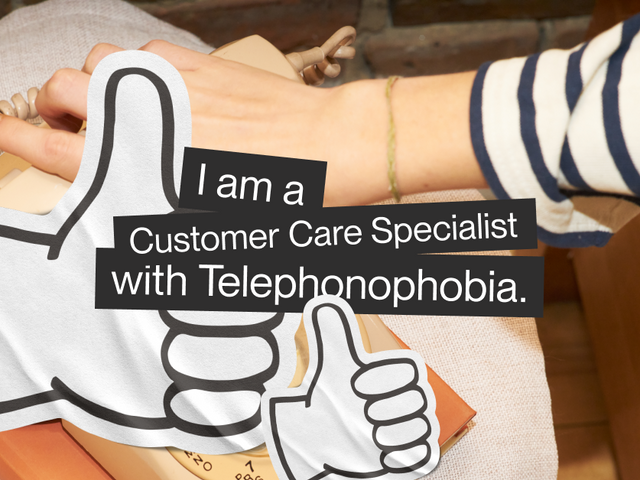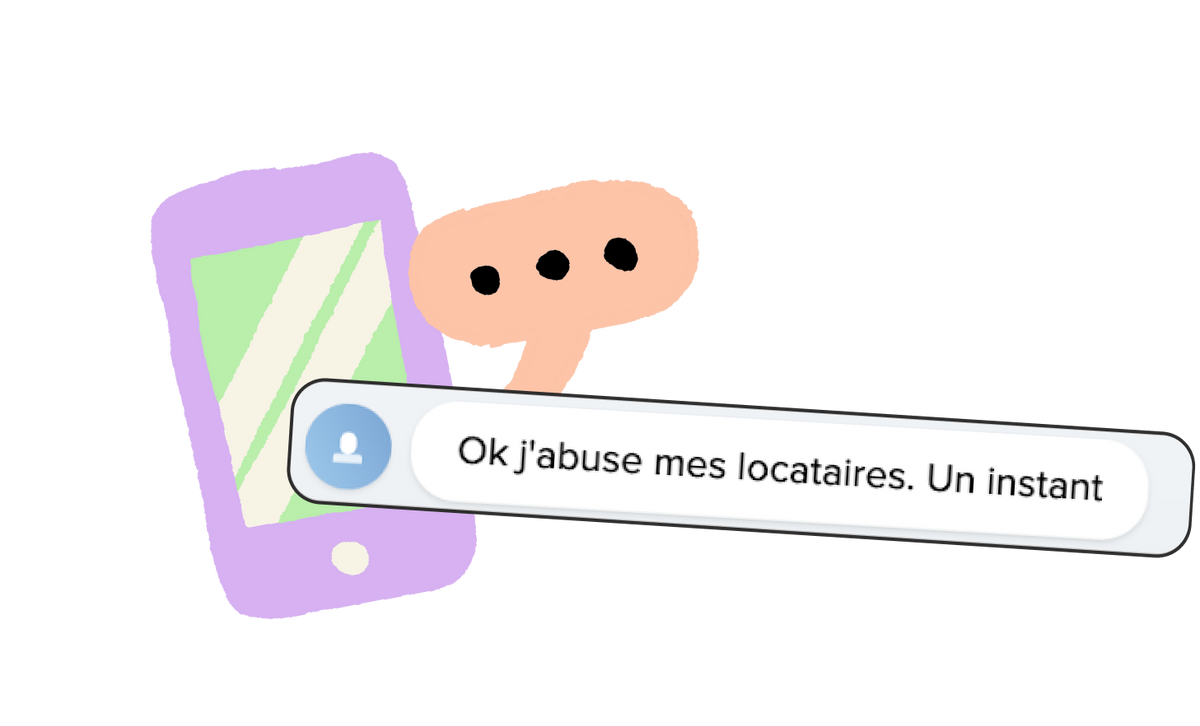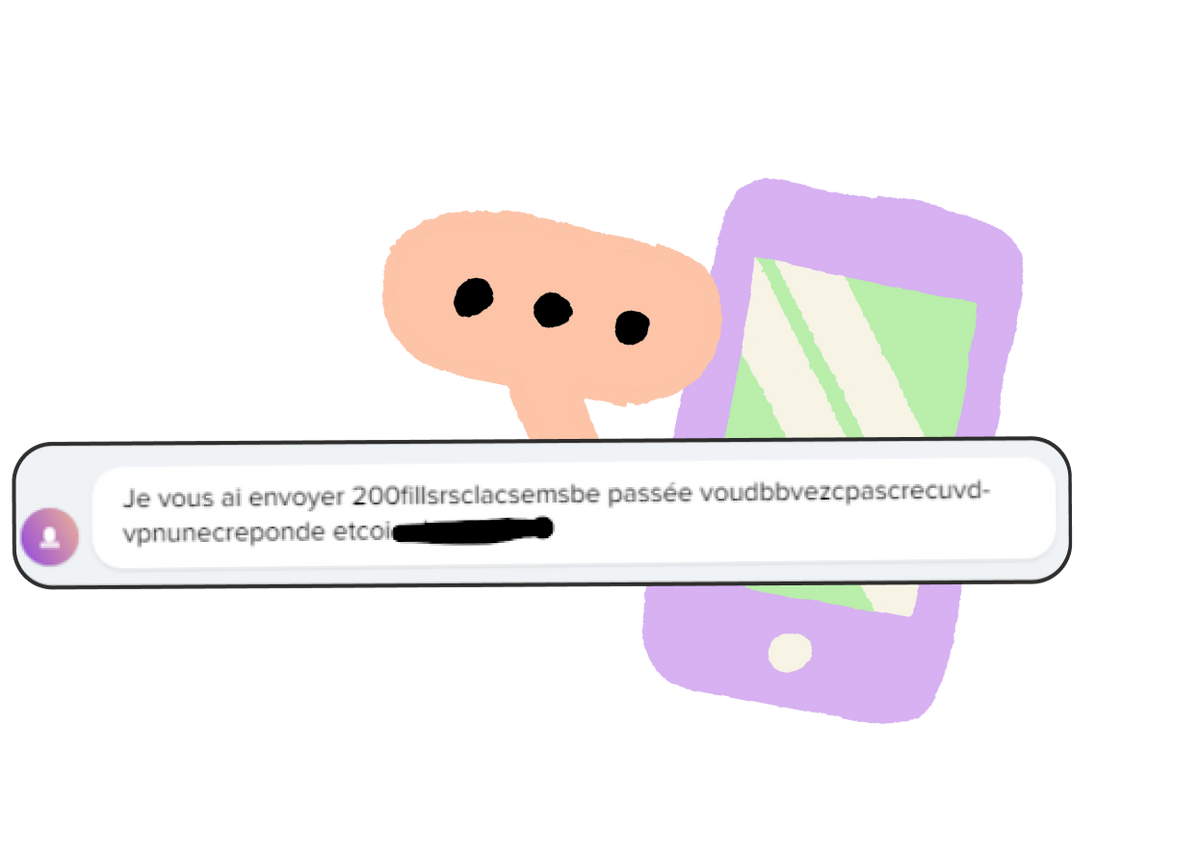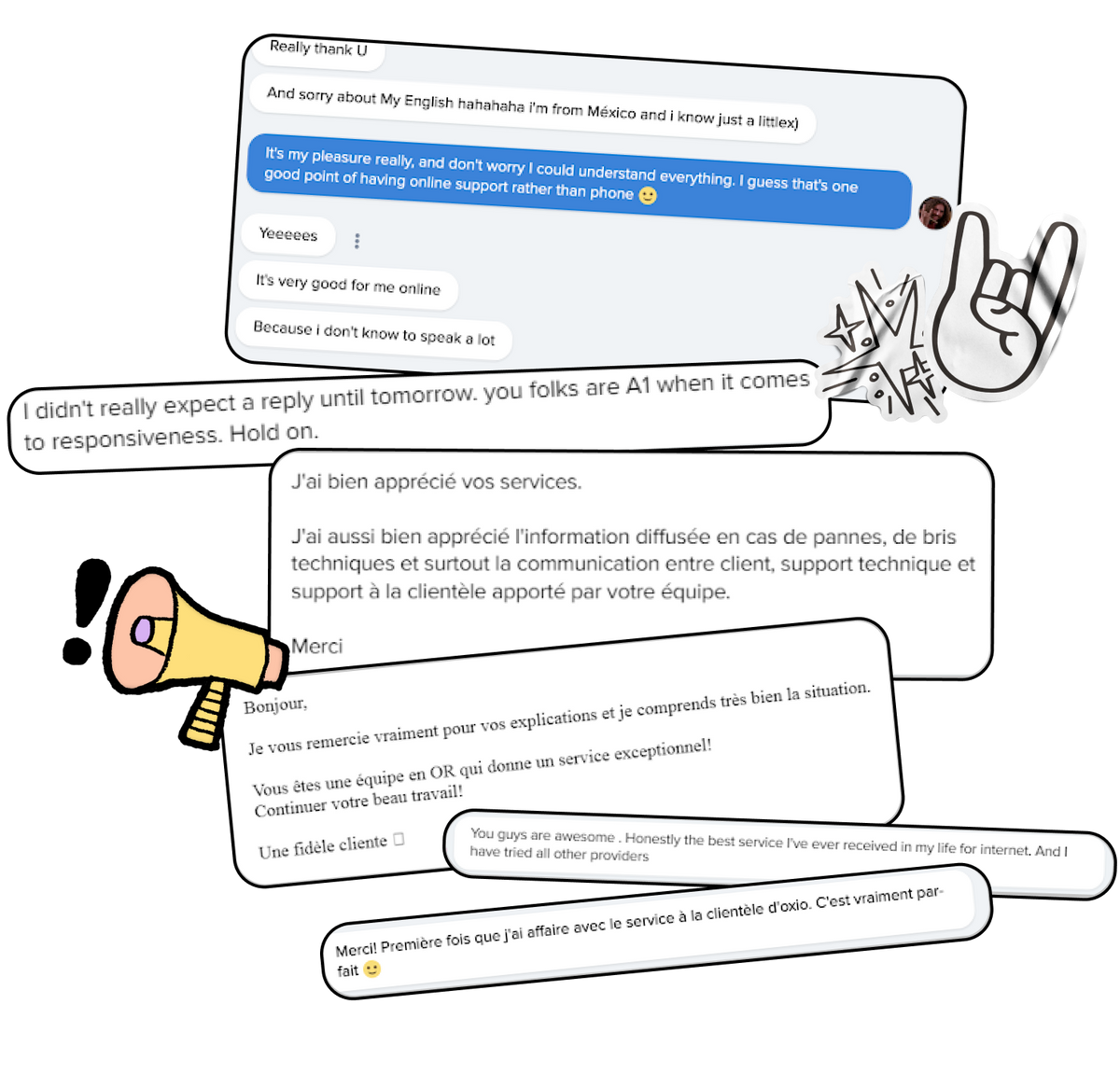
I’d like to introduce you to me.
I’ll start by introducing myself. Nycolas, 30 years old and I’ve been a Customer Care Specialist at oxio for almost two years. I'm a pretty introverted person and, above all, I hate talking on the phone—pretty unfortunate in my line of work. But, lucky for me, at oxio we don't use the phone! Before going any further, I’ll share some background on my background and how I ended up at oxio with this crazy, beautiful gang.
In my early twenties, I studied to become an ESL (English as a second language) teacher. During my studies, five years in total, I worked as a technical support agent for a cable company based in La Baie—if you don’t know where that is, it’s right here. After my studies, I taught for three years, but realized that teaching wasn’t for me. Class management skills are something I just don't have. However, I love languages and helping others. I wanted work that could incorporate those passions and oxio seemed like a good fit. After all, I also had a background in telecommunications. Oh yeah, and oxio had a huge selling point for me: no phone, unlike my last job in tech support.
The difference between phone and online support is day and night for both the agent (me) and the client (hopefully you). In this article, I’ll do my best to prove it to you and show you why I REALLY prefer online customer service. You’ll see my perspective as an agent, but also as a client, because yes, as a client, whenever possible, I use the online communication options: chat, email, SMS.
My experience as an over-the-phone technical support agent.
For someone who hates talking on the phone, you’re probably wondering how I ended up doing phone-only support for five years? Well, first, I had friends who worked at the company and they helped me a lot. Two, it was part-time. I wouldn't have done it full time. Finally, for a student job, it paid more than most other available jobs in La Baie. It’s also worth mentioning that I did three years of day support and two years of night support (more on this later).
This kind of work was very stressful for me, especially at the beginning. As an introvert, I hate making and taking phone calls. The fact that it was for a job seemed to lessen that anxiety—but not completely. Phone anxiety does exist! It's called telephonophobia. I'll elaborate on that in a moment, but let's get on with my story first.
When we provide support over the phone, we have to be quick to get and give the right answers. Customers have probably already been waiting a long time on the line and they’re, understandably, not thrilled at the idea of waiting again for us to find the right information. We’ve all tried to multitask on the phone, but the truth is, when you're on the phone, you can't really do much else. So yeah, it’s normal to get annoyed at all the inevitable waiting. Having to repeat everything constantly also gets annoying pretty quickly. On top of knowing that my clients are waiting, when I needed to ask my superiors and colleagues questions, I was often not welcomed with open arms. They made me feel like I was bothering them. I didn't know if I was going to get an answer or if I was just going to be told to go check my documents or that this was the kind of stuff I should already know. None of which is super helpful.
So, on top of not loving the phone, the working atmosphere wasn’t always pleasant. It seemed to me that the full-timers didn’t really like their jobs—I mean, a few of them seemed to do it out of passion or genuine interest, but, I noticed that part-timers were more positive and cheerful overall. Level two agents or supervisors, on the other hand, seemed to enjoy their jobs, unlike level one agents (like me) who just weren’t that into it. I don't have any evidence of anyone suffering from depression or burnout, but call center burnout—for lack of a better term—definitely exists. According to researcher Kristina Hultgren, call center jobs are notorious for employee turnover, absenteeism, burnout and emotional exhaustion.1
For a long time, there was no 24 hour support where I was working. But as soon as the part-time night shift was implemented, I applied for it. During the night shifts, I took between 5-10 calls and spent the rest of my shift completing other, related tasks. It suited me much better—even if it definitely messed up my whole sleep cycle. Remember, at the time, I was a student and was completing my teaching internships. So for me to actually want the night shift… Well, that says a lot.
But, in all fairness, I’d be lying if I said that there were no positives to working in a call centre. It allowed me to gain experience and I met some great people. I gained more self-confidence and managed to overcome my stress when face to face with a ringing phone. It was a challenge and I believe that, despite everything, it was a good student job. I would even recommend it as a part-time job, but I wouldn't do it full-time unless you’re addicted to this nerve-wracking kind of activity. If you're someone who likes to be on the alert, quick-witted and works well under pressure and stress, then a call centre might just be the job for you.
Telephonophobia: The fear of millennials?
The website linternaute defines Telephonophobia as an “Unreasonable fear or extreme anguish of making or taking telephone calls.”2 With the arrival of apps such as Messenger, WhatsApp or even just email, more and more people have really started hating actual phone calls. “According to a study conducted by the telephone service company Face for Business, 76% of millennials have anxious thoughts when they hear the phone ring, compared to 40% of their fellow baby boomers.”3 The lack of social references (gestures, body language, eye contact) can make us more aware of the sound of our voice or our choice of words.4 Which helps explain why using text to communicate seems to be becoming an increasingly popular.
Why I really prefer chatting. (And not the on-the-phone kind.)
Once I started at oxio, it didn’t take me long to fall in love with its culture and the way the people who work here work. For a better idea, you can read my colleague Shion's article: A day in the life of a customer care agent. Now that I know what it’s like to respond to clients in writing, I’ll never go back. In my opinion, it makes a lot more sense to answer online rather than on the phone, both for the agent and for the client. Here’s why:
- For me, the stress is gone. Instead of having to instantly have the right answer or reply right away, I can take some time to choose the right words and write a complete answer containing all the necessary information.
- By having the answer in writing, clients can refer to it later and a colleague can also see what has been said in the past which limits the client needing to repeat themselves over and over again.
- Clients also don't have to stay glued to their phone or in front of the screen waiting and waiting and waiting for an answer. We’re often asked questions that we answer (within 3-5 minutes) and then don’t hear back from the clients until 10-15 minutes later. With online service, it’s the clients (you!) who hold the big end of the stick. They can do something else while waiting and if we answer them and they’re the ones who don't have time, well, they can make us wait. And we prefer it this way! During this time, we can respond to other clients.
- The language barrier is really, really less apparent. We always manage to get by even if we’re not 100% fluent in the language the client is using. Here is a perfect example of a situation that would not have been possible over the phone:

With a translation tool, we managed to accommodate this client who had difficulty with English and French. No more accents that are difficult to understand or having to repeat the same thing over and over again so the person on the other end of the line can maybe understand.
I know what it’s like to describe your problem as best you can and the agent on the other end of the line doesn't understand a thing. It’s frustrating. In writing, the worst that’ll happen is that there will be spelling mistakes or a self-corrector who makes us chuckle by accidentally replacing “advise” with “abuse”.

We really hope that, in that case, it was a typo.
Some of our clients even mix up their conversations… We obviously get jealous:

Sometimes a few keys are hit by mistake, but don't worry, we eventually figure it out.

So many ways to communicate!
When it comes to contacting us, there are a few options. It can be done by email, Facebook Messenger, text message, the chat window on our site or we even have a Discord! On our side, everything happens in the same place: in a messaging software that includes all these methods (except Discord), so it's easy for us to navigate and access the history of all our past conversations.
Depending on the way you’ve chosen to reach out to us, there may be some subtle differences in how we answer. For example, if you send us an email, the response time may be a little longer because, to avoid spamming your inbox, we’ll try to give you all the information you need in a single message. And, of course, if you send us emojis or gifs via Messenger of text, you better believe we’ll do our best to return the favour.

How it feels to work at oxio.
In terms of work atmosphere, I find that my colleagues at oxio seem to love their work, regardless of their department. The atmosphere is always positive and no one ever (or at least rarely) makes you feel like you’re bothering them. I can write to any colleague regardless of the question, silly or not, and they’ll answer me with a nice little 🙂. Not knowing “basic” information isn’t stressful—everyone forgets certain things and as long as we seek to improve, well, that’s what counts.
This is what happens when you remove as much stress as possible from a workplace. You get employees and colleagues who are just happy and happy to answer questions.
Happy Colleagues = Happy Me = Happy Clients
Staff turnover is also really low. Most of the people who leave customer service at oxio are either:
- Students who have finished their studies and have found a job in their field or
- they’re moving to another department within oxio.
For example, did you know that our dear Danilo, copywriter extraordinaire, used to be part of the Customer Care team? He excelled there, but his talents were needed elsewhere. You can think of Customer Care at oxio as kind of like a springboard to help you find your place in the company. In fact, two of my former colleagues are now in human resources. This openness also helps ensure that pretty much everyone at oxio knows about our customer’s experience and works to make it the best it can be.
To be as transparent as I can, I should probably talk about the negatives too. They’re aren’t many, but… Because there are several possible ways clients can communicate with us, it sometimes happens that they use more than one method at the same time. This creates duplicates. When this happens, we can be two Customer Care agents at the same time on the same file and that can cause a little confusion on our side and on the client’s side. We therefore recommend that you use only one method. You also have to be careful how you write a message. A misplaced "!” or “…” can sound sarcastic. Rest assured that we always try to remain professional, without losing too much of our personality—we are human after all.
My chat experience with other companies.
It's not just since I've been working at oxio that I've been using online chat services to get help. My experience started a few years ago when I had trouble accessing my Playstation Network account. I found the Playstation site’s answers about my issue unclear and noticed a chat icon on their support page. I explained my access problem and in a few minutes, everything was resolved. Very good first impression. Sure, it was a simple thing to fix, but sometimes even the simple things make you wait forever on the phone, especially with big companies like Sony Playstation.
My second experience was with Bell. And yes! My cell phone is with the boogieman of the customer service industry. They have a bad reputation, but is it always justified? Personally, I’ve been so traumatized by what I’ve read online that I don’t even try to call them. When I need to, for example, change my cell phone (I dropped my last one in the stairwell of my apartment block and, to make a long story short, it didn't survive.), I go to an actual Bell store or kiosk to speak to someone directly. On the other hand, for questions about invoicing or my plan, I use their online chat service. And really, credit where credit is due, they are excellent. EXCELLENT!!! Say what you want about Bell, I love their chat service. Simple, fast, no nonsense. I clearly explain my request and I’m given an answer. They don't try to sell me anything and they take care of my problem and only that.
My last example is from the Fairstone company. This is a personal loan company. I recently purchased some furniture and the store has a partnership with Fairstone to finance purchases. Following the purchase, I had difficulty logging into my Fairstone account to make payments. I was missing some information so I contacted their customer service by chat. Again, quick, efficient, uncomplicated service. In a few sentences, everything was verified and I had the information I needed to access my account and make my payments. In short, I was going to be able to sleep soundly (which is good news, since I’d bought a box spring and mattress).
So, if Bell and a finance company are able to have top-notch online customer service, I think that's pretty damn good proof that this method works well.
My colleagues like it too!
I’ve spent this article talking non-stop about me. But, to help convince you (if you’re not already convinced) that online customer service is where it’s at, here are a few comments from my colleagues following a one-question survey I sent them. The question was simple: What do you love most about online customer service?
Here are some of the results:
I can respond to several customers at once to help them more quickly. Less difficulty with language diversity (easier to write than to speak). You can listen to music while working.
- Dave
MULTI-TASKING! I can reboot one customer's router while I help another with their credit card. I can assign a phone line to one customer while I wait for someone else's receiver to update. It avoids tension and bad moods. But on the other hand, sometimes text can be misinterpreted (both by us and by the client). But in the end, I think it's extremely positive. It also sometimes gives us time to confirm information with a colleague without having to make the customer wait, and above all, most importantly, it saves us from having to choose the music we’d play while you’re on hold!
- Sébastien
It allows you to take the time you need to analyze a file/problem before responding and not have the stress of the client uncomfortably waiting on the phone. Being able to take on several clients at the same time and be more efficient.
- Vanessa
I think it creates a better environment for our customers. They can contact and respond to us when it suits them rather than waiting in a queue on the phone (which can sometimes take hours). I like that it also allows us to follow up easily with customers. We send a quick little message to make sure everything is okay and it shows that we care about our customers.
- Mackenzie
Angry customers who end up telling you that you are the best because you had time to answer them well is the best reward!
- Claire
A conclusion for (and by) our clients.
So that’s that. I hope that my experience as well as that of my colleagues has helped convince you that online customer service isn’t all that bad.
We find that online customer service is much better for our clients and also for us. Gone is the Telephonophobia and anxiety that comes with answering the actual phone. You should never be afraid or stressed about contacting your supplier or responding to customers. If you still have fears despite everything, here’s my last argument, and it is a good one:
These are some customer comments that we share on our internal “#lovewall”—a page that gathers positive comments from customers who love the service. If I can't convince you, maybe they can:








